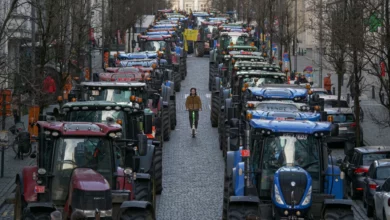In the wake of Sunday's landslide parliamentary victory for the ruling National Democratic Party, some Egyptian analysts are arguing that, despite constitutional clauses aimed at redistributing power and wealth through mandating workers and farmers seat quotas in parliament, the polls have distanced themselves far from that premise.
Abdel Hamid Basha is well-acquainted with the electoral process in Egypt. As an independent candidate, he unsuccessfully sought the farmers seat in parliament in the 1990, 1995 and 2010 polls.
"The farmer MPs do not represent farmers in any way,” Basha told Al-Masry Al-Youm from his hometown of Mahalla in the Nile Delta.
“These farmer MPs are not farmers, but rather businessmen and traders, large landowners, engineers, or other professionals,” Basha said.
According to the Constitution, at least half of all the 518-seat parliament must be allocated to representatives of workers and farmers. This clause was first introduced in 1956 and has remained in effect ever since.
A farmer representative, according to the Constitution, is "a person whose sole work and main source of living is cultivation, and resides in the countryside."
Agriculture cooperative societies–which are affiliated to the Ministry of Agriculture–determine the eligibility of politicians seeking to represent farmers in office. Workers eligibility, on the other hand, is determined by the state-controlled Egyptian Trade Union Federation, the sole federation of unions in the country.
Yet workers, farmers and NGOs alike claim these MPs do not represent the sectors of Egyptian society they are designed to.
Basha described Sunday's parliamentary elections as "yet another sham."
"Real farmers who attempt to run in elections are denied the right to nominate themselves, or are monetarily unable to nominate themselves," the 45-year-old farmer said. "And if nominated, they are sidelined."
“True farmers are simply unable to compete with the well-funded campaigns of businessmen who masquerade as farmers, and are thus the real farmers are kept out of parliament."
In Egypt’s individualized parliamentary system, where candidates are usually elected according to their social networks and spending capacities, rather than their political platforms, vote-buying plays a major role in the electoral process.
According to a recent independent study, around LE19 billion (nearly US$3.33 billion) was spent in the 2010 parliamentary elections through campaign efforts, up from LE6 billion in the last parliamentary poll.
The ruling NDP has managed to marginalize every political party, secular or religious, since the 1976 parliamentary elections where the system of political pluralism was first introduced following decades of single-party hegemony.
Moreover, power sharing and the redistribution of wealth, have also been restricted by the growing number of financial elites who successfully launch parliamentary bids.
"Over the past 20 to 30 years there have not been any MPs who genuinely represent farmers," said Khaled Badawi, director of the independent Rural Studies Center. "Most of the so-called farmer MPs are village mayors/chiefs, large landowners, and in some cases professionals, businessmen or retired officers."
In Minoufiyya Governorate, located in the Nile Delta, farmer-activist Abdel Meguid al-Khouli said farmers parliamentary representation has diminished gradually since the 1952 military coup–a political move ostensibly founded on socialistic principles.
“During the days of President [Gamal] Abdel Nasser, we used to have real farmer-representatives in parliament. Nowadays, however, we are not represented in anyway, shape or form,” said Khouli. "Those MPs, which have the classification of farmer, represent only their own business interests, or the interests of their party–which is typically the ruling party."
Bashir Saqr, a social activist in Tadamon Party (Solidarity), a farmers' rights group, argued, "There are no real farmers in parliament because the agricultural cooperatives, in coordination with the Interior Ministry, deny clearance for small farmers to run in elections."
Political reformers, including former chief of the UN's International Atomic Energy Agency, Mohamed ElBaradei have previously called for the annulment of Constitutional Article 87, which mandates the 50 percent quota for workers and farmers.
Those who oppose the article claim it ensures "fake representation in parliament."
Some political activists, however, disagree. They advocate addressing flaws in the system before invalidating the constitutional article outright.
"Around 70 percent of Egyptians are workers or farmers, and Article 87 is meant to guarantee the representation and rights of these underprivileged elements," Badawi said. "If we cancel article 87 then these elements will be further marginalized, and parliament will be monopolized by businessmen."




